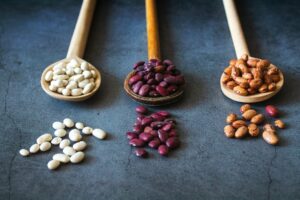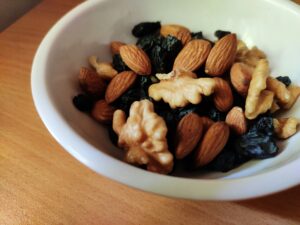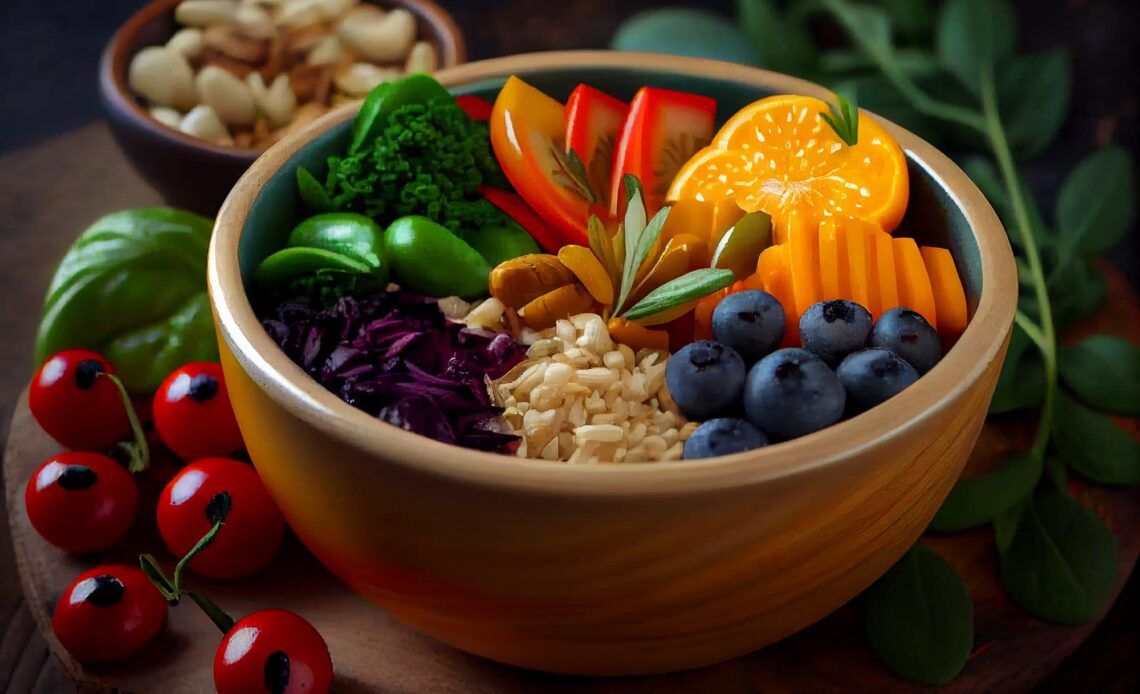Introduction
Cancer is one of the leading causes of death worldwide. While there are many factors that contribute to cancer risk, one’s diet can play an important role in cancer prevention and management. Certain foods contain beneficial compounds and properties that may help fight cancer. These cancer-fighting foods are often referred to as “super foods”.
Superfoods are foods that have an exceptionally high nutrient and antioxidant content. Antioxidants help protect cells from damage that can lead to cancer. Many superfoods also contain other compounds, like phytochemicals, that provide anti-inflammatory and anti-cancer benefits. Consuming a diet rich in superfoods may help lower the risk of developing various types of cancer.
This article will explore the cancer-fighting properties of top superfoods. The list includes colorful berries, cruciferous vegetables like broccoli and Brussels sprouts, green tea, fatty fish, beans, tomatoes, garlic, nuts, and more. Each superfood offers unique protective benefits, so incorporating a variety of these foods into your diet can provide a powerful nutritional boost. Research has demonstrated the cancer-preventing potential of these nutritional powerhouse foods.
Berries

Berries pack a powerful punch when it comes to cancer prevention. They are rich in antioxidants like anthocyanins, ellagic acid, and vitamin C, all of which can help neutralize cancer-causing free radicals.
Berries’ vibrant colors come from antioxidants called flavonoids. Research has linked flavonoids with slowing the growth of cancer cells and even triggering cancer cell death. Berries also contain ellagic acid, which has been shown to block metabolic pathways that can lead to cancer.
Studies specifically link berry consumption with reduced growth rates of cancer cells in the:
- Esophagus
- Colon
- Breast
- Cervix
- Prostate
The antioxidants in berries prevent and repair cell damage caused by oxidation. This can help stop cancer development and growth. Eating just 1/2 cup of berries per day provides antioxidants, vitamins, and plant compounds that are protective against many cancers.
Cruciferous Vegetables
Cruciferous vegetables like broccoli, cauliflower, cabbage and kale contain sulforaphane, a compound that has potent anticancer properties. Sulforaphane has been shown to kill cancer cells, reduce tumor size and prevent cancer from spreading or recurring.
The cancer-fighting power of cruciferous veggies comes from glucosinolates, phytochemicals that break down into indole-3-carbinol, DIM and sulforaphane during digestion. These compounds turn on antioxidant genes and suppress inflammation, factors that promote cancer growth. Multiple studies have found that people who eat more cruciferous vegetables have a lower risk of lung, colon, breast and prostate cancers.
Broccoli and broccoli sprouts are particularly high in sulforaphane. Eating them regularly may help prevent various types of cancer from developing. An analysis of studies found that men who ate more than 1 portion of cruciferous vegetables per week had an 18% lower risk of prostate cancer. Just 1⁄2 cup of cooked broccoli provides around 40% of the recommended daily intake for vitamin C and 10% for vitamin A, nutrients that enhance immune function.
Green Tea
Green tea is a rich source of polyphenols and catechins, which have strong antioxidant properties. The most abundant and potent catechin in green tea is epigallocatechin-3-gallate (EGCG). EGCG has been found to have anti-cancer effects by inhibiting tumor invasion and angiogenesis.

Angiogenesis is the process by which new blood vessels are formed to supply nutrients and oxygen to tumor cells. EGCG blocks angiogenesis by inhibiting the action of vascular endothelial growth factor (VEGF), a key protein that stimulates new blood vessel growth. This starves tumor cells of their blood supply and prevents them from spreading.
Numerous epidemiological studies have found that increased green tea consumption is associated with reduced risk of various cancers. A meta-analysis of observational studies found that drinking 5 cups of green tea per day was associated with a 16% lower risk of breast cancer. Another meta-analysis found that drinking 3 cups of green tea per day reduced colon cancer risk by 24%.
The anti-cancer effects of green tea have been demonstrated in laboratory studies as well. EGCG treatment inhibited growth and induced apoptosis (programmed cell death) in lung, colon, ovarian, bladder, and other cancer cell lines. Animal studies also show that EGCG administration helps prevent and slow tumor growth.
The catechins in green tea may also help enhance the effects of chemotherapy drugs while protecting normal cells. Overall, green tea is a promising cancer-fighting beverage due to its potent antioxidants like EGCG. More clinical trials are needed to establish optimal intakes for cancer prevention.
Fatty Fish
Fatty fish like salmon, mackerel, tuna, and sardines are high in omega-3 fatty acids, which have powerful anti-inflammatory effects. Eating more of these fish can reduce the inflammation caused by cancer.
Multiple studies show an association between eating more fatty fish and reduced risk for several cancers, including:
- Prostate cancer. A study of 47,882 men found those who ate fatty fish once per week had a 44% lower risk of metastatic prostate cancer over a 7-year follow-up.
- Breast cancer. An analysis of 88,463 women found those who ate more fatty fish had a 14% lower risk of breast cancer.
- Colorectal cancer. An analysis of 41,836 women found those who regularly ate fatty fish had a 42% lower risk of colorectal cancer.
The omega-3 fatty acids in fatty fish suppress inflammation, regulate immune function, decrease angiogenesis (formation of new blood vessels that feed a tumor) and increase cancer cell death. These beneficial effects may be the reason why fish oil intake is linked to reduced cancer risk.
To get the cancer-fighting benefits, aim to eat fatty fish at least twice per week. Salmon, mackerel, herring, lake trout, sardines and albacore tuna are highest in omega-3s. If you don’t eat much fish, consider taking a fish oil supplement to help meet omega-3 needs.
Beans

Beans are a superfood that should be a regular part of everyone’s diet due to their numerous health benefits. They are an excellent source of soluble fiber, which can help lower LDL cholesterol and promote digestive regularity. The fiber in beans can also help regulate blood sugar by slowing the absorption of sugar in the bloodstream after a meal. Studies show that higher fiber intake, especially from foods like beans, is associated with a reduced risk of developing colon cancer.
The soluble fiber in beans and other legumes is called oligosaccharides, which function as prebiotics in the gut. Prebiotics stimulate the growth of beneficial bacteria that support immune function and overall health. Beans also contain resistant starch that escapes digestion and feeds healthy bacteria in the colon. Some animal studies indicate beans may directly prevent colon cancer by inhibiting cancer cell growth and inducing apoptosis.
Beans, in addition to fiber, contain antioxidants that counter inflammation and oxidative damage linked to cancer and other diseases. They are an excellent plant-based source of protein as well as micronutrients like folate, iron, potassium, and magnesium. The combination of fiber, protein, and nutrients in beans supports satiety and stable energy levels. Overall, making beans a dietary staple can provide cancer-fighting benefits.
Tomatoes
Tomatoes are one of the most potent cancer fighting foods. Lycopene, a powerful antioxidant that has been shown to protect against certain types of cancer, gives them their deep red color.
Numerous studies have found that eating tomatoes and tomato products can significantly reduce the risk of prostate cancer in men. The lycopene in tomatoes is more bioavailable when processed into tomato paste, sauce, or juice compared to fresh tomatoes. Men who consume over 10 servings of tomato products per week have an estimated 34% lower risk of developing prostate cancer.
Believers attribute the ability to slow cancerous cell growth and tumor formation to the high lycopene content of tomatoes. As an antioxidant, lycopene neutralizes free radicals that can damage DNA. The combination of antioxidants like lycopene along with vitamins C, E, and beta-carotene found in tomatoes gives them exceptional cancer fighting properties.
While cooked and processed tomato products contain the most lycopene, fresh tomatoes still contain decent amounts. Enjoying fresh tomato salads, salsa, gazpacho, and cherry tomatoes can all contribute to a diet high in cancer fighting foods. Tomatoes are versatile, tasty, and provide a simple way to reap the antioxidant benefits of lycopene.
Garlic
Garlic contains sulfur compounds like allicin that give it its distinctive odor and flavor. These compounds have benefits for cancer prevention. According to research, garlic has immune-boosting and anti-carcinogenic properties.
The sulfur compounds in garlic help stimulate the immune system, potentially warding off cancer. Garlic also appears to block the formation of cancer-causing substances in the body. It may also prevent DNA damage and kill cancer cells.
Studies suggest that people who eat more garlic have a lower risk of stomach, colorectal, and prostate cancers. The anticancer properties seem especially apparent for gastrointestinal cancers. Adding more garlic to your cooking is an easy way to potentially reduce cancer risk and improve your immune function.
Nuts
Nuts are nutrient-dense foods that contain healthy fats, antioxidants, fiber, vitamins, and minerals. Studies show that eating nuts in moderation may help fight cancer in several ways:

- Rich in healthy fats. Nuts contain monounsaturated and polyunsaturated fats that are heart-healthy. These fats may also help reduce inflammation, which is linked to cancer development. Walnuts, pecans, hazelnuts, almonds, and cashews are high in these beneficial fats.
- High in antioxidants. Nuts are packed with antioxidants like vitamin E, selenium, flavonoids, phenolic acids, and phytosterols. These antioxidants help protect cells from damage that can lead to cancer. The antioxidant content is highest in walnuts, pecans, and hazelnuts.
- May reduce inflammation. Chronic inflammation is associated with increased cancer risk. The anti-inflammatory nutrients in nuts, such as omega-3 fats and vitamin E, may help lower inflammation in the body. Studies show regular nut consumption is linked to lower markers of inflammation.
- Suppress tumor growth. Test tube and animal studies suggest that the antioxidants, vitamins, minerals and plant compounds in nuts may inhibit tumor growth by regulating cell proliferation, apoptosis, angiogenesis and metastasis. More human research is needed.
Aim to eat a small handful of nuts most days of the week as part of an overall healthy diet. But be mindful of portion sizes as nuts are calorie-dense. Incorporating more nuts may be an effective and delicious way to protect against cancer.
Conclusion
In conclusion, many superfoods contain powerful antioxidants, vitamins, minerals, and phytochemicals that may help prevent and fight cancer. Some of the key superfoods to include in a balanced, plant-focused diet for cancer prevention are:
- Berries – Rich in antioxidants like anthocyanins that protect cells from damage. Blueberries, strawberries, blackberries, and raspberries are excellent choices.
- Cruciferous Vegetables – Contain sulforaphane and other compounds that boost detoxification enzymes and may block cancer growth. Broccoli, cauliflower, kale, cabbage, and Brussels sprouts are recommended.
- Green Tea – Packed with antioxidants known as catechins like EGCG that enhance cell protection and hinder tumor growth. Matcha green tea is an especially concentrated source.
- Fatty Fish – Omega-3 fatty acids in salmon, mackerel, sardines, trout, and herring may suppress inflammation, inhibit tumor development and boost immune function.
- Beans – Provide fiber, saponins and phytochemicals with antioxidant and anti-cancer effects. Lentils, chickpeas, black beans and edamame are excellent options.
- Tomatoes – Rich in the antioxidant lycopene, shown to lower cancer risk. Cooked tomatoes offer the most bioavailable lycopene.
- Garlic – Contains anti-cancer compounds like allicin that enhance detoxification and may stop cancer cells from proliferating.
- Nuts – Offer plant protein, fiber, vitamins, minerals and healthy fats that protect cells. Walnuts, almonds, pecans and hazelnuts are top choices.
A balanced whole foods diet with a variety of colorful fruits, vegetables, beans, nuts, seeds, and whole grains provides a powerhouse of cancer-fighting nutrition. While no one food is a silver bullet, filling your plate with natural plant foods can support your body’s defenses against cancer development and growth.


